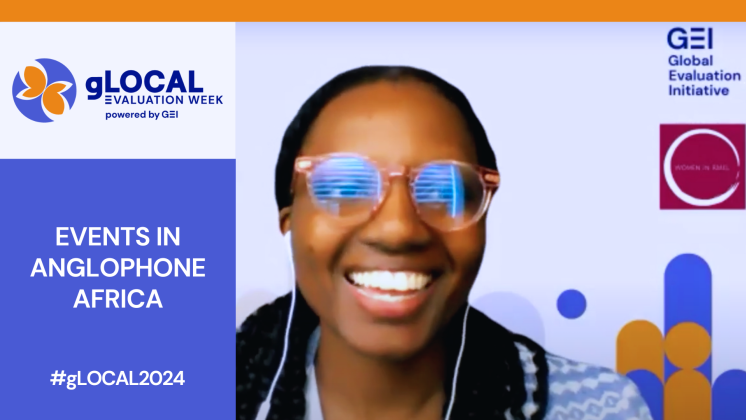gLOCAL Evaluation Week 2024 in Anglophone Africa

During gLOCAL Evaluation Week 2024, Anglophone Africa organized 40 events in Ghana, Kenya, Nigeria, South Africa, Tanzania, and Uganda. Topics discussed during the week included climate change, communities of practice, country-led evaluations, evaluation techniques, and digital and technology issues.
The Division of Performance Monitoring and Evaluation (DPME) - Tanzania Prime Minister's Office (Policy, Parliament and Coordination), in collaboration with Ardhi University Tanzania, hosted an in-person workshop on participatory geographic information system (PGIS) techniques, to provide some understanding and develop capacity on PGIS evaluation and monitoring techniques. The workshop consisted of lectures, practical sessions, and discussions about how partnerships between evaluators and policymakers can facilitate meaningful collaboration to inform policy solutions and drive transformational change. Workshop participants requested more sessions to further discuss transformational change in Tanzania.

Meanwhile, in Ghana, the Women in Research, Monitoring, Evaluation and Learning (Women in RMEL) hosted a session on the role of communities of practice in building and advancing careers in the RMEL space using the Women in RMEL community as a case study. Speakers gave testimonials attesting to how their community of practice played an influential role in developing, steering and accelerating their careers. Participants were encouraged to consider communities of practice within RMEL as launchpads to their careers, especially female RMEL professionals, to join the network and benefit from the virtual meetups.
The Center for Learning on Evaluation and Results for Anglophone Africa (CLEAR-AA), in collaboration with GEI-World Bank the Government of Malawi (Department of Economic Planning), and the Netherlands Ministry of Foreign Affairs, also hosted the gLOCAL event Evaluation Capacity Development through Country-led Evaluation: Insights from Malawi. The session provided insights on both evaluation practice and capacity development initiatives. It answered questions on the origins of country-led evaluations, successes for collaboration, learnings, and applications going forward. The conversation was buzzing with engagements from the participants, as they delved into questions on what makes an evaluation ‘country-led’, who “owns” and/or “initiates” the conversations with countries, and how are responsibilities shared.
In keeping with the gLOCAL 2024 theme, Evaluation and Transformational Change: Balancing Ambition and Realism, MERL Tech in collaboration with young and mid-career evaluators, hosted a session on Transformative evaluation practice through the lens of Artificial intelligence. Speakers shared how they are using and supporting the integration of AI in strengthening individual evaluation capacity and organization evaluation functions. This interesting session made use of demos, case studies, and discussions with participants to demonstrate the perils and promises of AI’s role in supporting evaluation’s ambition with transformation change. Moreover, Participants learnt about the fundamentals of generative AI technology, emergent fairness, accountability, transparency, and equitable (FATE) frameworks for the responsible use and integration of AI in their evaluation practice.